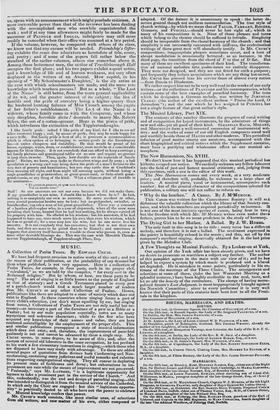MUSIC.
A Collection of Psalm Tunes. By EDWARD CRUSE.
We have had frequent occasion to notice works of this sort ; and yet the reason of their publication, or the probability of any demand for them when published, is not very apparent. Here is a collection of Psalm Tunes, for example, in four parts, each in its proper clef, " calculated," as we are told by the compiler, " for every sect in the Reformed religion." But by whom, or how, are these parts to be sung? The art of singing is as little known to the people of England as that of statuary ; and a Greek Testament placed in every pew of a parish-church would find a much larger number of readers than Mr. CRUSE'S or any other Collection of Psalms. Hence, publications like these are adapted to a state of society which does not exist in England. In those countries where singing forms a part of every child's education, (we don't mean squalling by ear, but singing from notes,) Collections of Psalm Tunes are not only useful but ne- cessary—as necessary a part of the furniture of a pew as a Bible or a Psalter ; but to our mule population especially, notes are so many mysterious and unknown characters ; while to the few who have acquired any knowledge of their names and value, they are here rendered unintelligible by the employment of the proper clefs. This and similar publications presuppose a state of musical information which does not exist; and, therefore, the improvement of parochial psalmody is not. and cannot be advanced by them a single step. Mr. CRUSE seems, in some degree, to be aware of this ; and, after the custom of several old labourers in the same occupation, he has prefixed to his work a few elementary instructions in singing,—which those who are disposed to learn may study with advantage. To these are added several pages of quotations from divines both Conforming and Non- conforming, containing many judicious and useful remarks and exhorta- tions respecting congregational singing. They all concur in deploring its present state of feebleness and decay; but exhortations to im- provement are vain while the means of improvement are not possessed. " Psalmody," says Mr. LATROBE, " is a legitimate opportunity for laymen to take a prominent part in the service of the Church." And this, undoubtedly, was the end and design of parochial singing—this was intended to distinguish it from the musical service of the Cathedral, in which only the Choir are engaged : but this " legitimate opportu- nity" is practically denied to all who have not the power to embrace it. Musical knowledge confers that power. Mr. Cause's work consists, like most similar ones, of selections From old writers, and new matter of his own, either composed or adapted. Of the former it is unnecessary to speak : the latter de- serves general though not uniform commendation. The true style of church writing—by which we mean that of TALUS, FAARANT, ROGER., GIBBONS, and PURCELL—should never be lost sight of; which in many of his compositions it is. None of those phrases and turns which belong to the theatre should be suffered to intrude. Simplicity should be inseparable from the choral harmony of the church : and that simplicity is not necessarily connected with stiffness, the ecclesiastical writings of these great men will abundantly testify. In Mr. CRUSE'S compositions, inappropriate phrases sometimes occur, and a love of abrupt modulation is occasionally betrayed : as an instance, in the third page, the transition from the chord of F to that of D flat. But many of them are excellent specimens of their kind. The transforma- tion of national melodies into psalm-tunes we entirely disapprove. They were not designed, and they are not fitted for such a purpose; and frequently they induce associations which are any thing but sacred. Mr. Cause has pressed into his service those of almost every nation —from Russia to Hindostan.
We rather suspect him not to be very well read in the works of our early writers—or the collections of PLAVEORD and his contemporaries, which contain some of the best examples of parochial harmony. The tune which he designates a German melody, was written- by JEREMIAH CLARKE (the author of the excellent anthem " Praise the Lord, 0 Jerusalem ") ; and the one which he has assigned to PURCELL has not a single feature of that great author's style.


























 Previous page
Previous page